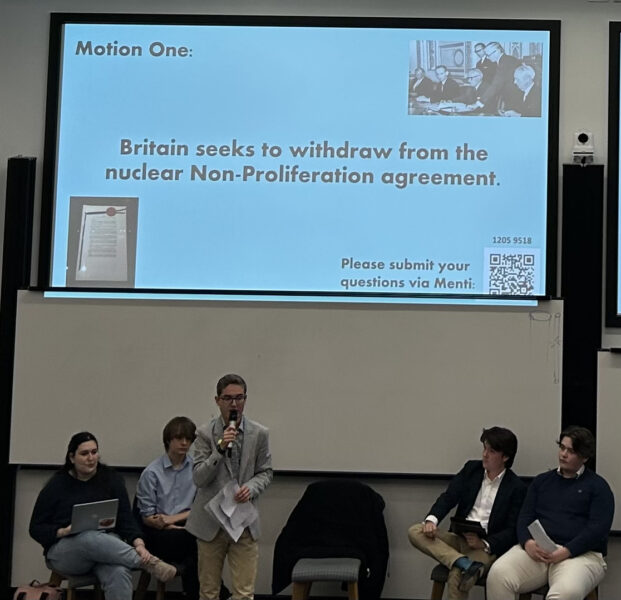
‘Question Time’ is the annual event in Exeter which attracts students from all sides of the political spectrum. Hosted by Politics Society, the student panellists included representatives from Labour Society, Conservative Society, and the Green Party Society. The audience roughly filled up the ground floor of Amory Moot Court, and their political views on the three motions were not asked beforehand.
The first motion focused on the UK’s involvement in the Treaty on the Non-Proliferation of Nuclear Weapons (NPT). The treaty focuses on preventing the spread of nuclear weapons and technology with the goal of achieving nuclear disarmament.
Diverging from Labour and Green representatives, Chairman of Conservative Society Theodore Filsell-Bayes argued in his opening speech that since we failed to create a nuclear-free world, the UK must withdraw from the NPT to tackle global imbalance.
Co-President of Labour Society Dan Froggitt urged the nation to show more commitment to the treaty to showcase its global standing as a superpower.
When asked if Britain should first disarm arsenal as a global power, Green Party Society President Thomas Richardson contended that Britain is not a superpower, and advocated for denuclearisation as the first step in helping Britain to regain its soft power, which Filsell-Bayes labelled ‘ridiculous’.
How would denuclearisation take place? Richardson’s answer is through international organisations with the necessary reforms in action.
When asked if the agreement undermines the UK’s sovereignty to determine its own defence strategy, the Conservatives’ answer was a resounding ‘yes’ while Richardson rejected the idea, declaring that states can act regardless of international law since ‘it’s whether you uphold it or not’.
Here the Conservatives won the highest number of votes in favour of withdrawing from the non-proliferation agreement.
‘The UK should decrease spending on foreign aid’ was the second motion of the evening. Richardson arguing for the Greens suggested that we should instead increase aid, especially climate reparations as the UK is in ‘climate debt’ and should pay its dues. However, he doesn’t disagree that there is too much bureaucracy concerning the use of foreign aid, and suggested reforms for international organizations such as the World Bank.
Despite the Chancellor, Rachel Reeves’s plan to cut foreign aid, Exeter’s Labour representatives insisted that we should be committed to foreign aid ‘from a personal basis’, but that changes need to be made on how it is used as the current policy is overly ‘paternalistic’. Froggitt identified former Conservative minister Rory Stewart’s method of giving direct cash transfers as the more effective way on handling foreign aid.
Speaking for the Conservatives, Exeposé Print Comment Editor Thomas Richardson (not to be confused with the Green Party Society representative) suggested that we should neither increase nor decrease foreign aid. He recognized Labour’s position that foreign aid can improve Britain’s standing on the world stage, but the interests of the British people should come first. Yet cutting foreign aid would be ‘reckless’ at a time when China’s influence is rising.
The issue of foreign aid is never separated from domestic government spending. How would the UK be expected to increase foreign aid when the NHS desperately needs more funding? The Greens’ Richardson proposed a wealth tax, which the Conservatives objected, stating that, ‘our citizens will leave’. Treasurer for Labour Society Mia Williams put forward that spending on foreign aid actually benefits the UK by increasing stability.
Once again, the Conservatives convinced the audience of their position and won this round’s votes as well.
[Rejoining the EU] is a betrayal of democracy.
Theodore Filsell-Bayes representing Exeter University Conservatives
Rejoining the EU was the final motion of the event. Both Labour and Conservative representatives agreed that rejoining was not an option – Filsell-Bayes described the idea as ‘a betrayal of democracy’. Williams emphasised that the country needs to focus on moving forward instead of going back to the past. This would include fostering a ‘practical relationship with the EU’ by ensuring that Britain benefits from Brexit.
Representing the Greens, Richardson supported rejoining the EU. He added that the key to rejoining would be ‘serious reform’– the running theme of his speeches as he admitted – since there is a ‘massive imbalance’ in the EU.
The effects of misinformation on the outcome of the Brexit referendum was the highlight of interparty questions. Froggitt indicated two-choice referendums as the bigger problem instead. Greens’ Richardson questioned whether voters truly understood the effects of their vote due to misinformation while Filsell-Bayes thought it was ‘dismissive’ to blame the will of the people on misinformation.
Throughout the evening, Labour consistently managed to find middle ground with the other two societies. But clearly, the two Thomas Richardsons could not think more differently.
The Greens’ position on rejoining the EU won the last round and the Conservative Society representatives were deemed the overall winner of Question Time, though the margins of the votes were not revealed by Politics Society.
Exeter students voted to withdraw from the non-proliferation agreement, against increasing foreign aid, and were open to rejoining the EU.


